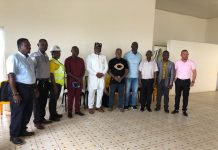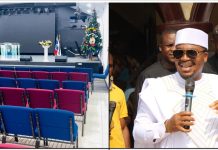
Africa-Press – Liberia. Education Minister-Designate Dr. Jarso Maley Jallah has observed that funding allocated to the country’s educational sector has been inadequate to address the numerous challenges.
She said though access to education remains key to successfully combating against poverty in Liberia; the sector continues to grapple with difficulties due to poor funding.
Speaking during a confirmation hearing held in the Chambers of the Liberian Senate on Wednesday, January 31, Dr. Jallah pointed out that the current budget of education lingers between 11% to 14% annually, with the total percentage of government expenditure on education at 11.19%, coupled with government expenditure on education total (percentage of GDP) at 2.69%.
According to her, the current 2024 budget is estimated at US$41,672,704, which is nearly 15% short of 2023 appropriation of US$43, 891,578, while US$36,770,299 was reported as actual spending.
Dr. Jallah furthered that many teachers are untrained and lack adequate teaching and learning materials.
She said both students and teachers are forced to learn and work, respectively, in inadequate or dilapidated classrooms, with hardly enough learning or teaching materials.
“These conditions are worse and especially challenging in remote areas of the country, a situation which hinders teachers’ willingness to work in these areas, exacerbating the use of volunteer teachers which impacts the effectiveness of student learning.”
She maintained that inadequate facilities, infrastructure and low budgetary allocation continue to strangulate the improvement of Liberia’s educational system.
Dr, Jallah stated that there exists over-age enrolment, which affects the effectiveness of learning and skill acquisition.
She added that Early Childhood Education (ECE) also suffers from similar problems, creating a ripple effect through the entire educational system, while low primary school completion rates also persists
She observed that there exists a high proportion of out-of-school children, especially from poorer, underserved and rural areas
According to Dr. Jallah, the outcomes of learning are low in the post-conflict nation, along with inadequate and insufficient TVET infrastructure.
She stressed that there is also a weak monitoring and supervision of schools and instruction.
“I stand before you as the nominated Minister of Education, deeply aware of the significant challenges and profound responsibilities that come with this role. Our nation’s education sector faces multifaceted challenges, which the ARREST agenda-an acronym representing Agriculture, Roads, Rule of law, Education, Sanitation and Tourism aims to address.”
According to her, the education component of the agenda captured in pillar three under the human capacity development sets forth three main focuses including Strengthening the national educational system to improve education outcomes, diversifying and promoting technical and vocational educational training and improving educational system and governance.
Dr. Jallah said these efforts are aimed at harnessing the untapped human capital potential of the country, which is essential for national development.
She emphasized that the ARREST agenda represents a commitment to breaking old patterns of late and non-enrollment, particularly among the poorest rural children, and to improving the quality, deployment, and motivation of the teaching force.
This, she added, is vital for addressing learning gaps and building the human capital needed to drive the country forward.
“When confirmed, my priorities will be to work robustly in addressing, or at the very least, ameliorating these challenges.”
She pointed out that standing in consonance with the ARREST agenda is the current Education Sector Plan (ESP) with its overarching goals to: increasing equitable access to education, improving the quality and relevance of teaching and learning, and strengthening the efficiency and management of the system.
Dr. Jallah recalled that the current national ESP, crafted in 2022 with an estimated cost of US$ 967.5 million over 5-years, covering 2022-2027.
She observed that the COVID-19 pandemic of 2022, provides a framework for addressing Liberia’s challenges and leveraging opportunities in the education system.
“The pandemic’s disruption, which included a six-month closure of schools in Liberia, was a critical catalyst for reevaluating and reforming educational strategies, particularly focusing on rectifying longstanding inequities and inefficiencies in education access. Covid-19 worsened an already fragile educational system. And although critical financial and other interventions have flowed into the sector since, they have not been enough to fully address many of the long-standing challenges.”
“To this end, Mr. Chairman and Honorable Committee Members, allow me to share with you some areas of the sector which must be prioritized, and for which your utmost moral, legislative, and budgetary support are earnestly needed.”
She, however, vowed to work closely with local and international partners to target job-creating sectors, to provide formal, non-formal, and informal training that equips youth with the skills needed for economic growth and personal development.
According to her, the foundation of lifelong learning is laid in early childhood.
“We must expand the training of specialized educators and services in this critical area to ensure a strong start for our youngest learners. Quality primary education is a cornerstone of our society. We aim to improve instructional standards, engage home and family support for learners, including those with disabilities and special needs, ensuring that every child has the opportunity to thrive. We will focus on strengthening learning outcomes in secondary education, especially in STEM.”
For More News And Analysis About Liberia Follow Africa-Press





